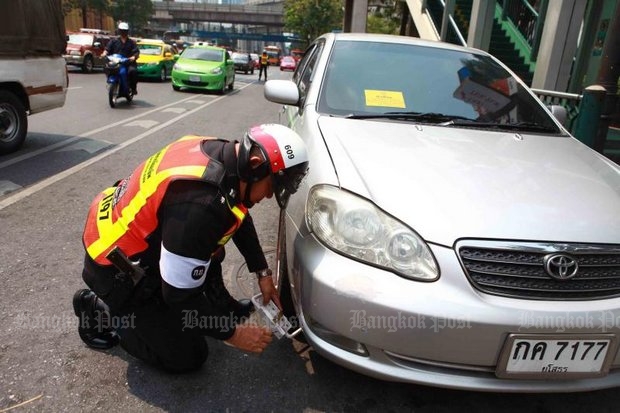
Motorists and passengers now face stricter penalties if they violate traffic laws, according to an order issued under the sweeping powers of Section 44 of the interim charter issued on Tuesday.
Aimed at curbing road accidents in the prelude to the Songkran holiday that normally sees horrendous road casualties every year, a set of legal measures was included in the Section 44 order announced in the Royal Gazette on Tuesday and they took effect immediately.
The order was signed by National Council for Peace and Order chief Prayut Chan-o-cha.
According to the published order, traffic authorities now have the authority to immediately move any car found parked in a prohibited area, while the owner of the car is required by the land transport law to pay the costs.
The same order also requires car drivers to fasten their seat belts and ensure his or her passengers do the same while travelling in the same car, while those who fail to pay their traffic tickets on time will not be able to complete their annual car tax payments.

Witthaya: Belt up, everyone
Passenger vans, meanwhile, are required under the same order to have a maximum number of passengers of 12.
Pol Lt Gen Witthaya Prayongphan, assistant national police chief, came out again on Wednesday to clarify the order, saying the owner of a car moved away from an area where parking is prohibited is required to pay for the costs.
The seat belt regulation, however, will in the beginning apply to only new cars that are already equipped with seat belts for all seats, he said, adding that as for old cars and pickup trucks, the Department of Land Transport (DLT) is considering whether to begin enforcing the same law for them some time before the Songkran festival.
In the case of taxis, both the driver and passengers will be required to jointly pay a fine if a passenger is caught failing to fasten his seat belt, he said.
Those who are served with traffic tickets must make payment of the fine within 15 days, or else they will be unable to complete their annual car tax payment, Pol Lt Gen Witthaya said.
DLT director-general Sanit Phromwong said his department and the police have already synced their databases, meaning that the department now knows who fails to pay traffic ticket fines on time. If the traffic ticket is not paid first, a driver will be given only a temporary certificate for car tax payment that will expire in 30 days until the fine is paid, he said.
A driver will be given 15 days to appeal starting from the day he or she receives a letter with a fine, according to the same Section 44 order.
But if traffic authorities affirm that the decision to give that particular driver the traffic ticket is right, the case will be forwarded to police investigators who will then consider bringing the case to court, said the same order.
Since last September, only 11% of about 680,000 traffic tickets issued have been paid, said Pol Lt Gen Witthaya.
Thanapong Jinvong, programme manager of the Road Safety Group Thailand, meanwhile said to soften expected fierce resistance, he would suggest that tough crackdowns on violations of these traffic regulations, especially fastening seat belts, should be delayed for about four to five months.
During this time, he said, verbal warnings and explanations should be given instead of harsh legal action against offenders.
Public campaigns designed to improve public understanding about the government's enforcement of these traffic regulations are also needed to foster good habits among motorists and passengers, said Mr Thanapong.